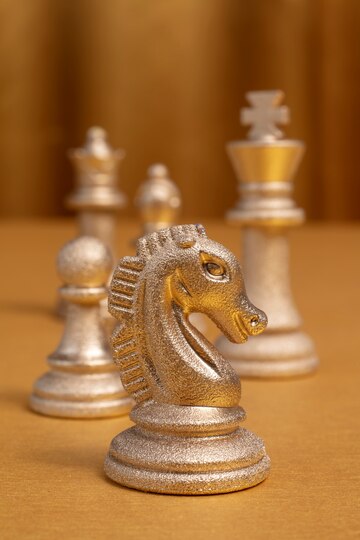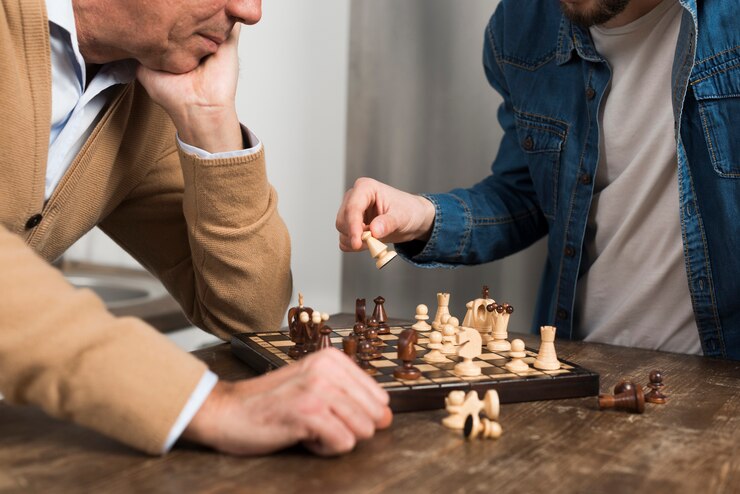Image by jcomp on Freepik
Introduction
Chess, frequently hailed because of reality as the “hobby of kings,” is a timeless and strategic conflict of wits that has captivated minds for masses of years. Originating in India around the sixth century and has become a worldwide phenomenon, challenging game enthusiasts to navigate a complicated battlefield with truly sixty-four squares and 32 quantities. In this article, we’re going to delve into the intricacies of this game, exploring its facts, crucial rules, and the paintings of strategic play.
A Brief History
The game has rich and storied statistics, tracing its roots all over again to historic India wherein it has ended up referred to as “chaturanga.” Over the centuries, the sport unfolded in a few unspecified times in the future of the Silk Road, adapting and evolving as it reached one-of-a-type cultures. By the 15th century, this game had taken its cutting-edge-day form in Europe, with the familiar portions and recommendations we recognize nowadays.
The Chessboard and Pieces
The chessboard is a checkered battlefield with sixty 4 squares, alternating between mild and dark colorations. Each participant starts with sixteen portions: a king, bishops, and eight pawns. Understanding the motion and importance of each piece is important for studying the sport.
The King’s Role
The king is the centerpiece of the chessboard, and its safety is paramount. If a participant’s king is threatened with seizure (checkmate), the sport concludes. Strategic positioning and considerate maneuvering are vital to guard the king inside the path of the healthful.

Image by Freepik
The Queen’s Dominion
The queen is a powerful strain, able to move horizontally, vertically, and diagonally. Its versatility makes it a sturdy offensive and protective piece, frequently gambling a pivotal feature in controlling the board.
The Rooks, Knights, and Bishops
Rooks circulate horizontally and vertically, protecting prolonged distances. Knights display precise “L-normal” actions, at the same time as bishops traverse diagonally. Each piece brings its private strengths and weaknesses, contributing to the difficult tapestry of the chess approach.
Pawns: The Foot Soldiers
Pawns may additionally circulate in advance however capture diagonally. Their preliminary confined motion belies their strategic significance. Pawns can be promoted to every specific piece upon accomplishing the opponent’s decrease all another time rank, which embodies a further layer of tactical depth.
The Rules of Engagement
Understanding the guidelines of chess is vital to gameplay. Moves, captures, and particular maneuvers contribute to the dynamic nature of the game.

Image by Freepik
Check and Checkmate
When a king is below direct chance, it’s miles in “check.” If there is no criminal circulate to dispose of the risk, it results in “checkmate,” and the game concludes. Achieving checkmate goals is a sensitive balance of offensive and defensive abilities.
Draws and Stalemates
Chess moreover recognizes draws and stalemates. A stalemate happens at the same time as a participant has no criminal movements but is not in check. Draws can also arise because of insufficient material, threefold repetition, or the 50-skip rule.
The Art of Strategy
Chess is greater than an exercise; it’s far a strategic ballet wherein game enthusiasts need to expect and counter every pass. Here are some key strategic factors to preserve in thoughts:
Opening Moves
The starting up gadgets the volume for the complete business corporation. Players hire several organizing techniques to control the center, grow portions, and beautify their positions.
Middlegame Mastery
The middle game is a dynamic section in which gamers maneuver to manipulate and release tactical attacks. Understanding pawn systems, piece coordination, and growing weaknesses within the opponent’s characteristics is crucial.
Endgame Expertise
The endgame is wherein precision turns into paramount. Skillful endgame play consists of changing blessings, executing checkmates, or exploiting pawn imbalances.
The Community of the game
Chess has a colorful and inclusive community that spans the globe. From community chess clubs to online structures and the internet hosting hundreds of plenty of game enthusiasts, enthusiasts of all information tiers could interplay in the highbrow challenge of the sport.
Tournaments and Grandmasters
Tournaments display very remarkable levels of play, with grandmasters demonstrating mastery of approach and techniques. These sports lure international interest, raising chess to a spectator hobby.
Online Platforms
In the virtual age, online systems like Chess.Com and lichess.Org offer available arenas for gamers to compete, observe, and connect with fellow enthusiasts internationally.
Conclusion
Chess, with its rich data, difficult suggestions, and strategic intensity, remains a fascinating hobby that transcends cultures and generations. As gamers interact within the complicated dance of actions and countermoves, they lose up the splendor of an exercise. This is as lousy a lot about intellectual prowess as it is approximately the laugh of opposition. Whether done casually with buddies or pursued at the very exquisite aggressive stages, chess stands as a testament to the long-lasting energy of the human mind in the face of strategic challenges.
FAQ:
How do I begin playing game?
To begin playing chess, familiarize yourself with the regulations of the game, such as how every piece acts and the goal of capturing the opponent’s king. You can discover beginner tutorials online or don’t forget to join a local chess club for guidance and exercise.
What are the blessings of gambling of this game?
Playing chess offers numerous benefits, which include enhancing vital questioning abilities, improving concentration and cognizance, boosting reminiscence retention, and fostering strategic planning skills. It’s also a laugh and a tough way to stimulate the mind and sell mental agility.
Are there exclusive variations?
Yes, there are numerous versions of chess, together with speed chess (blitz and bullet), chess960 (also known as Fischer Random Chess), and crew chess (consisting of bughouse or doubles chess). Each variant offers a unique twist on the conventional sport, imparting gamers with diverse challenges and stories.
How can I improve my competencies?
Improving your chess talents takes exercise, staying power, and determination. Consider studying conventional games played by grandmasters, fixing chess puzzles, training often towards combatants of various talent ranges, and analyzing your very own games to identify areas for development.
Can children learn to play?
Yes, children can learn to play chess at a young age and advantage significantly from the level. The game facilitates developing important thinking abilities, improves concentration, and teaches vital life classes which include patience, sportsmanship, and strategic making plans. Many schools and network organizations provide chess packages tailor-made to youngsters of every age and skill tier.
Is a game of luck or talent?
This game is typically a sport of skill, as fulfillment relies upon a participant’s capacity to think significantly, strategize successfully, and count on their opponent’s moves. While luck can also play a minor position in positive situations, which include whilst both gamers are calmly matched, the outcome of recreation is predominantly decided through the players’ talent and decision-making talents.
Can I play online?
Yes, there are numerous online structures and mobile apps wherein you can play chess with opponents from around the arena. These systems offer numerous features, such as stay video games, asynchronous play, tournaments, and ability-based matchmaking, permitting gamers to experience the game at their tempo and degree of competitiveness.



